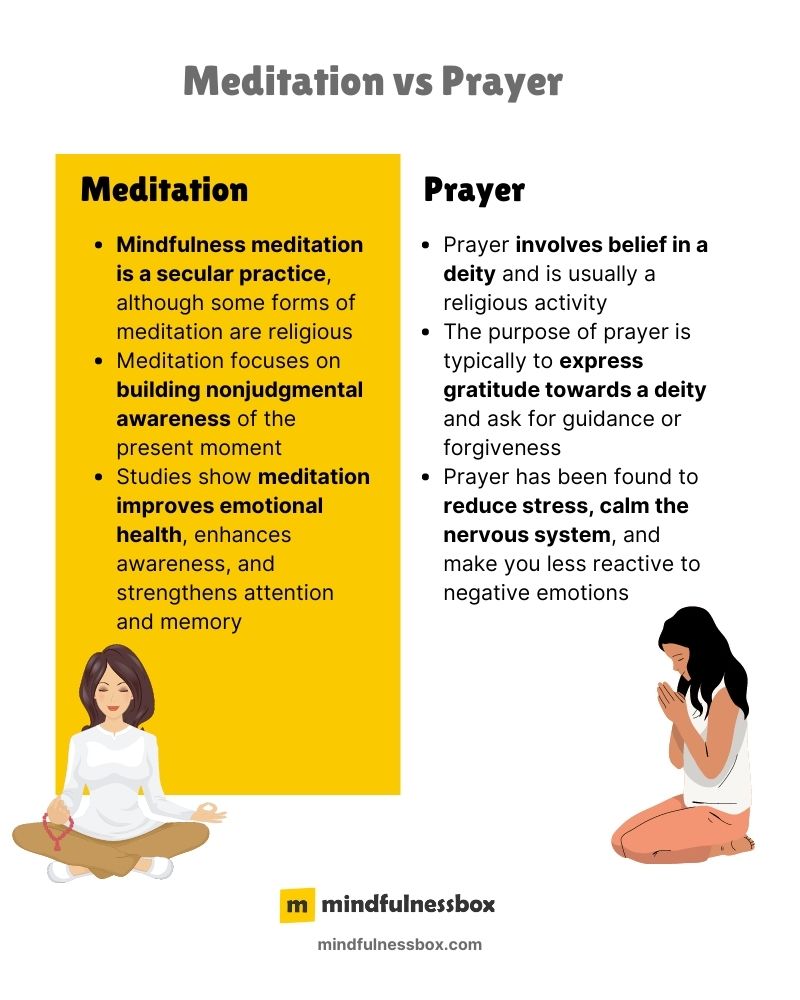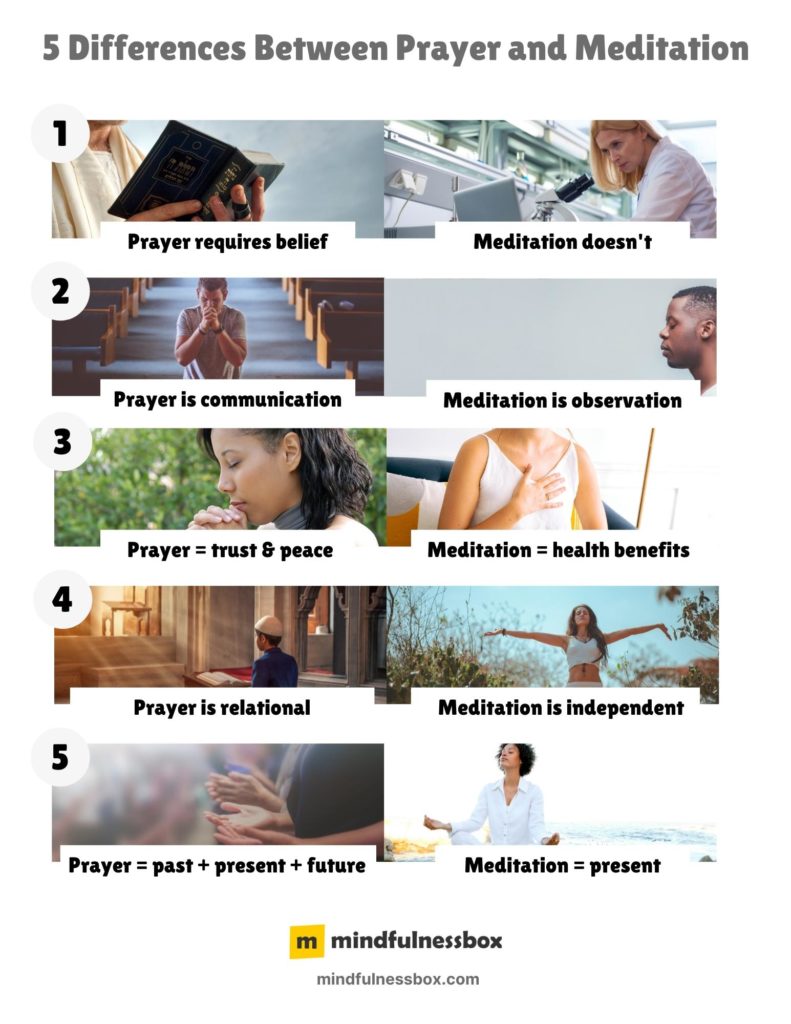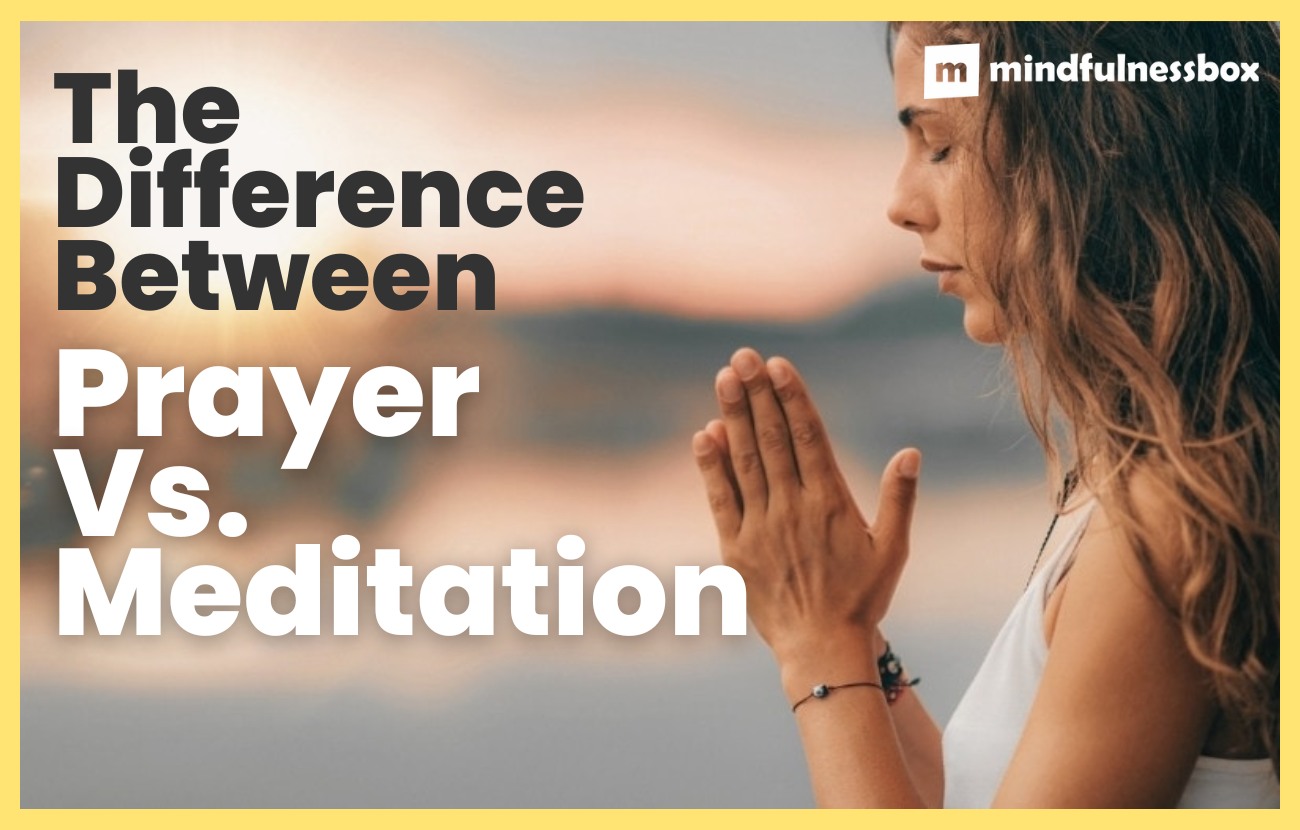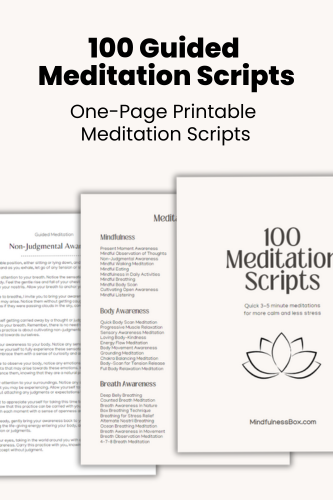The main difference between prayer and meditation is that prayer involves belief in a deity and active communication, while meditation requires no beliefs and is an independent practice of nonjudgmental observation.
Meditation and prayer have a close relationship.
These 100 meditation scripts were created to help beginner and intermediate meditators practice key mindfulness concepts like self-love, forgiveness, gratitude, and inner peace.
Designed to fit into busy schedules, each meditation script lasts 3-5 minutes. Perfect for starting or closing a group meditation; for yoga, coaching, or therapy sessions; or for your personal meditation practice.
Both have been around for thousands of years, and to make matters more complex, there are forms of prayer that look a lot like meditation, and forms of meditation that look a lot like prayer.
For the purposes of this article, when we talk about meditation, we’ll be discussing mindfulness meditation rather than any religious meditation or contemplation practice.
And mindfulness meditation is different from prayer in a number of ways.
Let’s explore:
What’s the difference between meditation and prayer?

Prayer is followed by practitioners of a religion and includes a wide variety of activities, like contemplation, requests for divine intervention or direction, gratitude, and forms of religious meditation.
Meditation may also take place in the context of a religion, but mindfulness meditation is a secular practice focused on independent introspection and observation.
Prayer and meditation have both been shown to provide positive benefits to stress, anxiety, and mood.
Meditation provides an additional array of research-backed benefits from improved sleep to lower blood pressure.
Is meditation a form of prayer?
No. Meditation is its own unique practice.
Meditation doesn’t require the belief in a deity, and the goal of meditation is to practice a nonjudgmental awareness of the present moment. Also, meditation is introspective rather than communicative like prayer is.
Although secular meditation is not a form of prayer, religious meditation could be seen as a form of prayer. For example, Christian meditation is another way that Christians reflect on divine teaching.
Prayer is often seen as a form of meditation. For example, contemplative prayer involves holding religious texts or divine will in your attention in a deep and introspective manner that shares much in common with meditation.
Does prayer have the same benefits as meditation?

Prayer and meditation have some similar benefits, but there are some differences.
Prayer has been the subject of a variety of scientific studies and has been found to reduce stress, calm the nervous system, and make you less reactive to negative emotions. Prayer is often seen as a way to build inner peace, in addition to religious benefits.
There has also been research done on intercessory prayer—for example, when you pray for someone to get better when they’re sick. Studies have shown mixed evidence and little support for any real-world effect that this element of prayer may have.
Meditation, on the other hand, shows many or most of the same benefits as prayer in scientific studies, while also showing other benefits like:
- Improved emotional health
- Enhanced awareness
- Lengthened attention spans
- A reduction in memory loss
- Improved self-control
- Reduction in chronic pain
5 differences between prayer and meditation

Meditation and prayer share some similar traits and benefits, but they’re different in many ways.
- Prayer requires belief. Meditation doesn’t. One of the key differences between meditation and prayer is that prayer requires a belief or trust in some kind of divine source. Meditation doesn’t. With meditation, you’re simply training your brain to have an improved ability to stay in the present moment and observe everything nonjudgmentally.
- Prayer is communication. Meditation is observation. Typically, prayer is a line of communication with a focus on change: praying for improved health, or for forgiveness, or for a certain outcome to be achieved in life. (Although of course, gratitude for what you already have is an important component of prayer, too). Meditation, on the other hand, is about nonjudgmental observation. Nothing needs to change. Everything is as it should be. Your job is simply to observe.
- Prayer can add a sense of trust and peace. Meditation has additional research-backed mental health benefits. Prayer is no slouch in the benefits department. Studies have shown that prayer can help calm your nervous system, make you less stressed and anxious, and improve your mood. These are also benefits of meditation. On the other hand, meditation has been the subject of hundreds of randomized controlled trials, and has shown similar benefits to prayer and more: less stress and anxiety, but also enhanced creativity, improved focus, improved sleep, improved blood pressure and heart health, and more.
- Prayer is relational. Meditation is independent. Prayer doesn’t exist without someone or something to pray to. By definition, prayer requires communicating with a deity. And prayer is often about other people: you might be praying for your family’s health, for example. On the other hand, meditation is independent. It’s about self-exploration. You’re not communicating with anyone else when you meditate.
- Prayer is about the past, present, and future. Meditation focuses on the present. Prayer could cover any time period: past, present or future. However, in meditation, you’re building your attentional muscle to enable yourself to better stay in the present moment. When your thoughts drift away from the present, your goal is to drift back to the present.
Meditation and prayer can coexist
Both prayer and meditation provide positive benefits and can be incorporated into a holistic mindfulness practice.
If you’re not religious, it may not make sense to pray.
However, for those who are religious and practice prayer, there’s no reason meditation and prayer can’t coexist.

My mindfulness practice kicked off in 2016 with a ten-day silent retreat. Since then, I’ve read dozens of books about mindfulness and completed hundreds of hours of meditation. Thinking about what makes humans happy, calm, and peaceful is endlessly fascinating to me.


